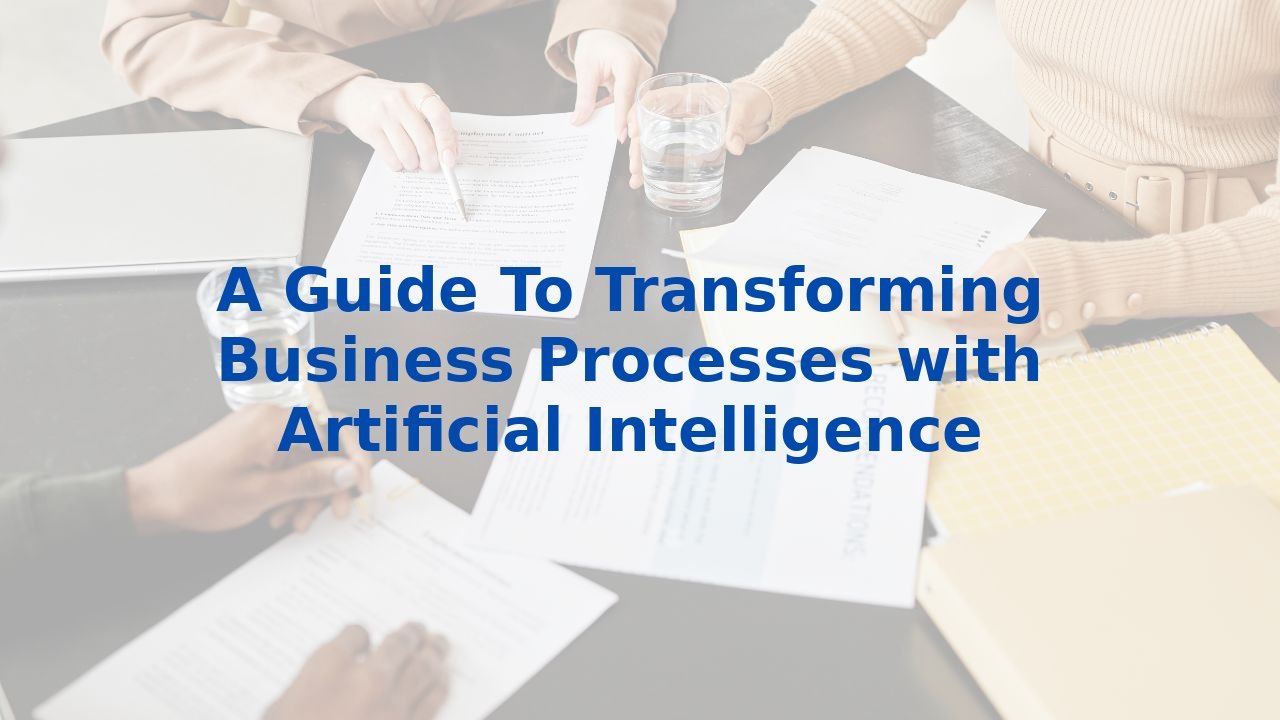A Guide To Transforming Business Processes with Artificial Intelligence
A Guide To Transforming Business Processes with Artificial Intelligence
In the relentless pursuit of efficiency in today’s fast-paced business landscape, leveraging Artificial Intelligence (AI) has emerged as a transformative strategy. Organizations are increasingly recognizing the immense potential of AI in streamlining operations, reducing costs, and enhancing decision-making. This guide explores how AI can revamp various business processes, ultimately driving your organization to new heights of success.
1. Improving Meetings
Meetings are essential but often riddled with mundane administrative tasks that can drain productivity. AI simplifies this process dramatically. With tools that utilize voice recognition and automated note-taking, teams can shift their focus from administrative duties to more strategic discussions. Imagine a world where scheduling is fully automated and meeting highlights are transformed into actionable tasks within moments. Harnessing this efficiency allows employees to maximize their contributions, fostering an environment of creativity and collaboration.
2. Enhancing Sales and Marketing
Sales and marketing are fertile grounds for AI applications. Analytics powered by AI can reveal hidden opportunities within customer relationships. By identifying high-value prospects, sales teams can channel their energies towards clients who are more likely to generate returns. Simultaneously, AI-driven chatbots serve as tireless assistants that provide prompt responses to customer inquiries, enhancing the client experience and driving revenue growth. This symbiosis of technology and human effort redefines the sales landscape.
3. Assessing and Improving Customer Service
Customer satisfaction is the heartbeat of any successful business. AI can significantly bolster this by performing routine evaluations of service calls, offering insights into performance quality. With high accuracy, AI identifies areas needing improvement while simultaneously alleviating the workload on human representatives. The result? A more efficient customer service team equipped to focus on complex issues needing the human touch. When the customer is happy, the entire organization thrives.
4. Improving Product Development Processes
Innovation can be stifled by the constraints of traditional product development. AI is disrupting this norm by employing generative design software, which explores a range of design possibilities based on specified criteria. This not only accelerates the product development cycle but also saves resources by eliminating the need for numerous prototypes. With AI, companies can iterate designs rapidly, fostering a spirit of innovation that keeps them ahead of the competition.
5. Automating Content Generation
In the content-driven world, speed is vital. Organizations are increasingly employing AI to generate text quickly and efficiently. From articles to web copy, AI tools can produce substantial volumes of content in mere seconds. By shouldering the burden of mundane writing tasks, human content creators can devote their time to strategic planning and creativity, amplifying both the quality and impact of their outputs.
6. Streamlining HR Processes
Recruitment and human resource management benefit tremendously from AI automation. By utilizing AI for initial candidate assessments, organizations can significantly reduce time and resources spent during recruitment cycles. HR teams can redirect their focus toward talent development and employee engagement initiatives, ensuring a more dynamic and satisfied workforce. Education and training become pivotal in realizing the full potential of these AI tools.
7. Optimizing Business Processes
Optimizing processes through AI involves harnessing its capabilities for business process management. AI streamlines operations by automating repetitive tasks and revealing critical insights from large data sets. It enables organizations to act proactively, addressing deviations from expected outcomes before they snowball into larger issues. This real-time analysis translates to better decision-making and a more agile workplace.
The Benefits of AI
1. Automation of Routine Tasks: AI liberates employees from repetitive tasks, allowing them to engage in more meaningful work. 2. Enhanced Decision-Making: With advanced analytics, AI sheds light on trends and future predictions, empowering organizations to make informed decisions. 3. Real-Time Monitoring: Continuous process monitoring powered by AI detects anomalies promptly, helping organizations maintain operational steadiness.
Investing in Employee Training
While implementing AI technology is pivotal for process enhancement, equipping your team to thrive in this new landscape is equally crucial. Training employees to effectively leverage AI tools insures that:
- Adaptability: Employees become nimble, quickly acclimating to changes in workflow.
- Data Interpretation: Skilled employees can harness AI insights, enriching their decision-making capabilities.
- Process Optimization: A trained workforce can identify and exploit AI applications across processes.
- Continuous Improvement: Persistent education encourages an innovation mindset as employees refine processes using AI insights.
Conclusion
Adopting Artificial Intelligence offers a profound opportunity for organizations to redefine their operational capabilities. From automating tasks to enriching decision-making, the application of AI can lead to remarkable improvements across various business domains. By investing in technology and training your workforce effectively, organizations can not only enhance operational efficiency but also carve out a competitive edge in today's dynamic business environment. Transform your processes with AI and witness the paradigm shift unfold.



